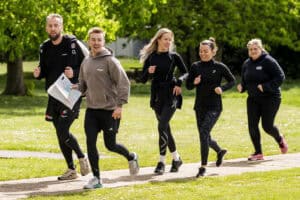
Despite a varied national curriculum and efforts to incorporate work placements into formal education, every year hundreds of thousands of young people leave education only to find themselves unemployed without the necessary skills and self-confidence to navigate the job market. For many school leavers and soon-to-be graduates, the jump from education to employment is far too wide and a large proportion of young people are falling behind. Our education system needs to do more to prepare young people for the world of work, and these changes need to be made now.
Here, Jenifer Cameron, CEO of Action4Youth, discusses the importance of young people leaving school with an understanding of the opportunities available and the role of schools and the wider community in empowering them with the skills to take control of their futures.
At the end of 2019, there was an estimated 763,000 young people aged 16 to 24 in the UK who were not in education, employment or training (NEET). This figure represents 11.1% of young people in the UK, of which almost 40% were deemed unemployed, and just over 60% were deemed economically inactive. These figures are staggering and have severely adverse consequences, not only for the young people themselves, but also for society more generally. Unemployment has indirect detrimental effects on both the economy and social cohesion, as well negatively impacting the wellbeing and livelihoods of those affected. Whilst these figures see NEETs at one of the lowest levels since 2011, it is evident that we still have a long way to go in ensuring young people do not get lost in the jump from education to employment.
One could argue that a vital steppingstone is missing to aid young people in moving from full-time education into the world of work. If we don’t take steps to tackle this issue now, the problem will only intensify, with key skills and talents missing from our economy, and young people not realising the extent of their potential. Whilst many children boast a range of exciting ideas about ‘what they want to be when they grow up’, these visions tend to get blurred in adolescence as the reality of their future creeps closer. We need to work to ensure that all school leavers are equipped with a rounded idea of the opportunities available them, the confidence to pursue these prospects, and the skills to ultimately be successful in the workplace.
Careers advice within the education system
Schools are already expected to incorporate careers advice into their curriculum. This often materialises in the form of a week’s work experience and a one-off workshop on the world of work. The problem with these schemes is that whilst they do provide students with a range of benefits, they are relatively limited, failing to give students a wider understanding of how society functions and, more importantly, the various ways that their individual skills and talents can fit into and contribute their community. It’s time we move away from the traditional conception of careers advice and instead move towards extensive, tangible, real-life experience.
What our education system does really well is provide young people with the wide variety of knowledge and skills that comes with a well-rounded curriculum. However, understanding how to transfer these skills effectively into real life situations, and picking up the other necessary skills needed to excel in your career, is whole new ball game. At times, the rigidity of our education system can prevent young people from understanding how the skills they have learnt at school can benefit their career, negatively impacting not only their career prospects but also their motivation to learn. For example, all school children should develop a grasp of critical thinking and problem-solving, whether that was learnt through the sciences or humanities. If they also participated in a broad range of work experience, they would be given the opportunity to see how these abilities can be applied in various real-life situations and to develop these skills further.
On top of drawing out and enhancing the skills that young people already possess, comprehensive work experience also introduces those who participate to a whole host of new knowledge and skills – how different sectors operate, how to communicate in the workplace, how to adapt to new environments, and how each employee’s unique talents and experiences shape the business in which they work. It also gives young people the opportunity to build up a network of professional contacts, levelling the playing field between students of different backgrounds. Having a grasp of these key concepts can help to narrow the skills gap between employees and employers, making young people more employable and successful, which in turn ultimately stands to benefit employers in the long run as well. When regularly immersed in different workplace environments, young people can harness the vital skills and experiences that give them the necessary self-confidence, knowledge and abilities to pursue and excel in the right career path for them.
What we can do moving forward
When it comes to connecting the dots between education and employment in practice, there’s a range of activities that teachers can organise to bolster support for their students. For example, arranging a variety of ‘go and see’ days with different organisations in the community can provide invaluable insights into sectors that young people might not have even known existed. The broader the range of these visits, the better the understanding that students will then have about what types of jobs exist and how they all contribute to wider society. Looking across various sectors, such as the arts, police and criminal justice, health and social care, professional services, and charities and fundraising, the possibilities are endless. Whilst work experience opportunities are sometimes limited by age restrictions and GDPR, any form of real-life experience stands to offer students valuable insights. Opportunities to interact with different people in the community, draw parallels between others’ experiences and their own, and learn first-hand about the realities of different career paths will not only broaden students’ skillsets and horizons, but may also challenge their way of thinking and help them feel better connected to their communities. If we can effectively enable both young people and employers to see the two-fold benefits of work experience, the motivation to provide and partake in comprehensive work experience may improve across the board.
In addition to efforts outside of the classroom, the positive impact of these days out can be enhanced by complementary workshops focusing on building skills and self-confidence. Leading sessions that outline the transferable skills that students have already acquired over the years, for example, does vital work in building students’ self-confidence and guiding them through the first steps between education and the world of work. Workshops of this kind stand to benefit female students and students from disadvantaged backgrounds the most, as these demographics are seen to routinely miss employment opportunities due to a lack of self-confidence and assertiveness. With increased levels of confidence and a better understanding of the skills they already have, the prospect of starting a new career can seem less daunting and young people are more likely to apply for jobs for which they may have otherwise mistakenly felt ill-equipped.
And finally, as well as the aforementioned real-life experiences and skills workshops, taking time to educate young people on the importance of physical and mental wellbeing will further equip them to embark on the next stage of their lives. Destigmatising mental health issues, recognising how physical health contributes to overall wellbeing, and learning more about the environment has the potential to not only improve the way that young people regard themselves, but also to equip them with the tools to cope with potential periods of unemployment in the future. By hosting a range of theoretical seminars and practical workshops on these topics, both in the classroom and in collaboration with local organisations, school leavers will be equipped with yet another key set of skills that can guide them through the minefield of entering the world of employment and even beyond into later life.
Overall, the figures show that our education system is not going far enough in preparing young people for the next stage of their lives. More extensive, real-life workplace experience needs to be made available to young people to firstly educate them on the countless career paths that they can embark on post-education, and secondly introduce them to the skills needed to excel in the world of work. Educators can also build on this by providing more comprehensive guidance on how skills developed in education, as well as each person’s unique talents and capabilities, can be transferred into the workplace. By challenging the way that young people think about themselves and others, broadening their horizons and building on their experiences, we can endeavour to close the knowledge and skills gap that currently exists, and get more young people into employment, training and further education.
Please help us make this page more visible by sharing it through your own social networks.






